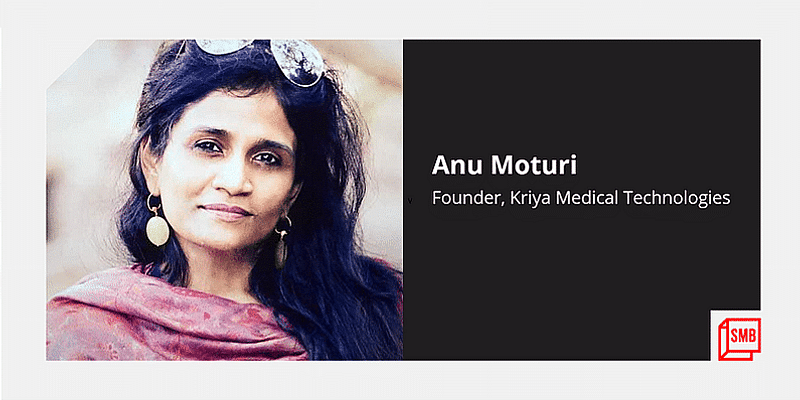Making a difference: meet this woman entrepreneur building a multi-crore medical device manufacturing firm
Kriya was founded in 2012 by Anu Moturi. It manufactures and sells medical devices in the molecular diagnostics, biochemistry, and diabetes categories. Kriya’s aim is to provide quality products with a consistent supply.
The COVID-19 pandemic was a wake-up call for many countries to improve their health infrastructure and underscored the significance of having sound healthcare facilities. The pandemic also made many realise that India has a huge potential to take the lead in the healthcare sector.
“Startups and small MSMEs pivoted their business models, came up with frugal innovations and paired up with larger companies and suppliers to create quality PPEs that we could even export to the world,” Deepak Bagla, Managing Director and CEO of Invest India, highlighted at TechSparks 2021.
However, the road to improving healthcare facilities is long and arduous. Moreover, the pandemic has reiterated the importance of relying on made-in-India manufacturing players.
One of the companies that aim to make a difference in the medical devices segment is Chennai-based Kriya Medical Technologies.
Founded in 2012 by Anu Moturi, manufactures and sells medical devices in the molecular diagnostics, biochemistry, and diabetes categories. Recently, its product called KRIVIDA Novus received approval from ICMR and DGCI. KRIVIDA is an RT-PCR kit to detect SARS-CoV-2 including RdRp, N-gene, S-gene, endogenous-Internal Control (IC), and an Omicron variant-specific S gene probe.
In an interaction with SMBStory, Anu, shares the intention behind starting a company and explains why this sector continues to need the support of several stakeholders.
The beginning
While working with the Ford Motor Company, Anu got to travel around the world. During her travels, one thing that caught her eye was how basic and affordable healthcare was a challenge in several developing countries. Then, tragedy hit her family when her father passed away due to diabetes despite taking great care, which led Anu to explore this cause deeper.
While her experience at Ford Motor Company gave her an insight into manufacturing, supply chain management, and more, Anu’s regular visits to China where her husband was working further gave her an understanding of the Chinese medical devices landscape. “What India is to pharmaceuticals, China is for medical devices,” she says.
Talking about the ecosystem there, she says, that discipline, work culture, supportive policies, and taxes have contributed to propelling the medical devices sector in China. “In many factories, 90 percent of the workforce are women!” she notes.
In 2011, she left her job and a year later, she finally started working on the company with Rs 12 crore. Initially, she set up an R&D unit in Chennai and would get the devices (glucometers) contractually manufactured from Chinese units. “The idea was to introduce the products in the market and get a sense of how they were being received,” Anu explains.
Five years later, she started her own unit. She began with manufacturing glucose monitoring devices, and then forayed into other categories such as molecular diagnostics and biochemistry.

The business model
Kriya is majorly a B2B business. It counts leading labs such as Lal Path Labs, Thyrocare, Metropolis Healthcare, and more among its clients. Today, the company is working towards becoming a complete solutions provider in the healthcare space. “We also built digital platforms that enable the labs to take custody of the patient samples.”
The technology for this has been built in-house.
Kriya’s aim is to provide cost and quality-driven medical devices and also reduce the turnaround time for supplying them.
She also believes that KRIVIDA Novus is going to be a game-changing product. “It not just detects whether the person is COVID-19 positive or negative but also differentiates between variants i.e. whether it is Omicron, its sub-lineages or Delta,” she explains. This helps in treating the patient according to a specific kind of variant. The results take about 45 mins.
In FY21, Anu claims to have clocked Rs 14.5 crore and is aiming to clock more than Rs 28 crore this year.
Evolving landscape and the road ahead
According to reports, more than 70 percent of India is dependent on imports for medical devices. However, with the onset of the pandemic, it is clear that the opportunity in this space is huge. The Indian healthcare industry reached $190 billion in 2020, and according to the India Brand Equity Foundation (IBEF), it is expected to reach $370 billion by 2024-2025, due to increased demand for specialized and higher quality healthcare facilities. India houses several players such as Allied Medical Limited, Trivitron Healthcare, Transasia Bio-Medicals in this space.
Anu is a witness to the changing landscape. She highlights that before the pandemic, it was 25 percent cheaper for manufacturers to produce in India — and this number has only become more attractive at 40 percent. Additionally, there is a change in perception as well. Anu says that while starting the company, it was a huge challenge to get financing, etc.
“Investors would not pick up my calls, I had to explain a lot to the banks. Medical devices were not even recognised as a sector,” she says, adding, “VCs and PEs are well-versed in evaluating the technology sector but not the medical devices one. And the fear of not knowing enough also holds them back somewhere.
She explains, “COVID-19 was terrible but has been a great accelerator in terms of what it has done to the medical device industry in India.”
She says that the government has also taken the initiative to attract investments for this sector but “things will not change overnight.” Gaps like funding avenues for setting up manufacturing units, building an ecosystem of qualified personnel, and involving more women in the setup can oil the wheels of this sector.
Going forward, Kriya wants to establish itself as a product and R&D-based company, scale up its product lines. The team is also working to introduce new products in the molecular diagnostics and healthcare space.
Edited by Kanishk Singh









![[Startup Bharat] Y Combinator-backed BeWell Digital is enabling the digital transformation of radiologists](https://images.yourstory.com/cs/2/40d66ae0f37111eb854989d40ab39087/ImagesFrames31-1648033042143.png)

